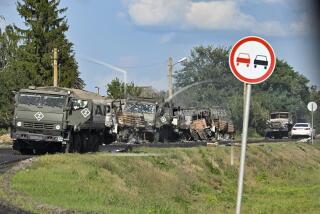Russian forces leave zones in Georgia
- Share via
NADARBAZEVI, GEORGIA — Russian troops on Sunday began dismantling positions in the so-called security zones in Georgia that they have occupied since the war in August, Georgian and EU officials said.
Moscow faces a Friday deadline for pulling back its troops under a deal brokered by French President Nicolas Sarkozy on behalf of the European Union. Hundreds of EU observers began monitoring Russia’s compliance last week.
A pullback would probably mean at least some reduction of tensions between Russia and the West after their worst confrontation since the collapse of the Soviet Union. But substantial points of dispute remain.
The Russian zones extended roughly four miles into uncontested Georgian territory.
Moscow vows to keep thousands of its troops stationed in two separatist Georgian regions that it recognizes as independent countries -- South Ossetia and Abkhazia -- which appears to stretch the terms of the cease-fire and which the Georgian government denounces.
South Ossetian leader Eduard Kokoity on Sunday said security would be tightened by reducing the number of crossing points from Georgia into the republic to two, the Interfax news agency reported.
On Aug. 7 Georgian troops launched an offensive to regain control of South Ossetia, where Russia has troops stationed as peacekeepers.
Russia sent a large force that quickly routed the Georgian military and pushed deep into the former Soviet republic. In late August, Russian troops mostly pulled back to the security zones and last month they pulled out of some more positions, including six checkpoints and temporary bases in and near the port of Poti.
The Russian presence in Poti, on the Black Sea, had been particularly galling for Georgia because it is hundreds of miles from South Ossetia, where the war broke out and where most of the fighting occurred.
The EU-brokered agreement also calls for both sides to return troops to the positions they held before the fighting broke out -- but Russia’s plan to keep about 8,000 troops in the regions well exceeds the number reportedly there before the fighting began.
More to Read
Sign up for Essential California
The most important California stories and recommendations in your inbox every morning.
You may occasionally receive promotional content from the Los Angeles Times.













